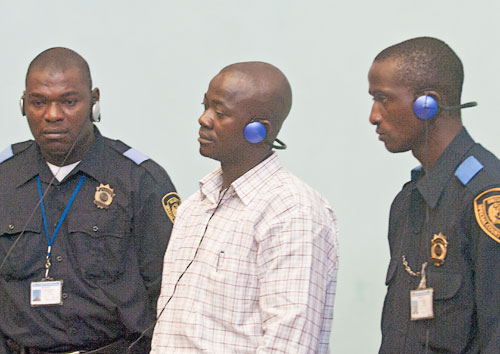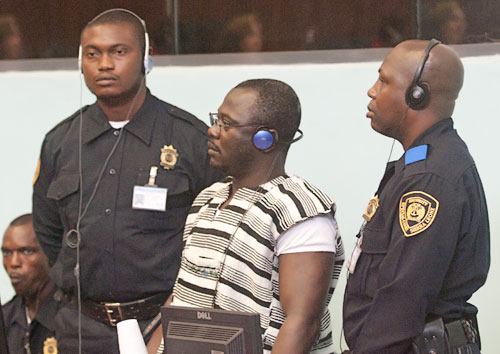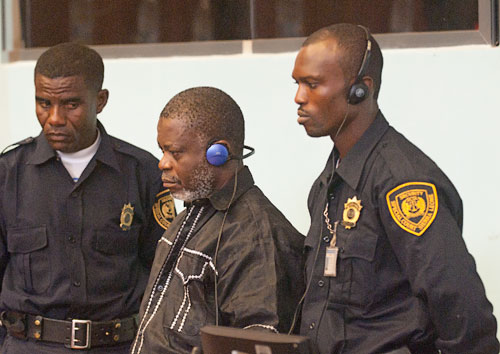
Issa Hassan Sesay was born 27 June 1970 in Freetown. He was a senior member of the Revolutionary United Front (RUF), serving 1993 to 1997 as an RUF Area Commander, and from about April 1997 to December 1999 as RUF Battle Group Commander. In May 2000 he became Interim Leader of the RUF. During the AFRC regime, he was a member of the AFRC’s ruling body.
On 25 February 2009 Issa Sesay was found guilty on 16 counts of the 18-count indictment, for acts of terrorism (a war crime), collective punishments (a war crime), extermination (a crime against humanity), murder (a crime against humanity), murder (a war crime), rape (a crime against humanity), sexual slavery (a crime against humanity), other inhumane act (forced marriage) (a crime against humanity), outrages upon personal dignity (a war crime), cruel treatment (a war crime), other inhumane acts (a crime against humanity), use of child soldiers (other serious violation of international humanitarian law), enslavement (a crime against humanity), pillage (a war crime), attacks against UN peacekeepers (other serious violation of international humanitarian law), and murder of UN peacekeepers (a war crime). He was acquitted on the charges of murder of UN peacekeepers (a crime against humanity) and taking peacekeepers hostage (a war crime).
Issa Sesay is serving his 52-year sentence at Mpanga Prison in Rwanda. In July and August 2010 he was called as a Defence witness by former Liberian President Charles Taylor at his trial in The Hague.

Morris Kallon was born 1 January 1964 in Bo. From about May 1996 to April 1998 he was an RUF Deputy Area Commander. From about April 1998 to December 1999 he was RUF Battle Field Inspector. During the AFRC regime, he was a member of the AFRC ruling body. In early 2000 he became RUF Battle Group Commander. In about June 2001 he became RUF Battle Field Commander.
On 25 February 2009 he was found guilty on 16 counts of the 18-count indictment, for acts of terrorism (a war crime), collective punishments (a war crime), extermination (a crime against humanity), murder (a crime against humanity), murder (a war crime), rape (a crime against humanity), sexual slavery (a crime against humanity), other inhumane act (forced marriage) (a crime against humanity), outrages upon personal dignity (a war crime), cruel treatment (a war crime), other inhumane acts (a crime against humanity), use of child soldiers (other serious violation of international humanitarian law), enslavement (a crime against humanity), pillage (a war crime), attacks against UN peacekeepers (other serious violation of international humanitarian law), and murder of UN peacekeepers (a war crime). He was found not guilty on the charges of murder of UN peacekeepers (a crime against humanity) and taking peacekeepers hostage (a war crime).
Morris Kallon is serving his 40-year sentence at Mpanga Prison in Rwanda.

Augustine Gbao was born 13 August 1948 in Blama. He was a member of the Sierra Leone Police from 1981 to 1986. He joined the RUF in Liberia in 1991. Prior to the May 1997 coup in Sierra Leone, he was the Commander of the RUF Internal Defence Unit, in command of all RUF security units. From about November 1996 to April 1997 he was a senior RUF commander in Kailahun District. From mid-1998 to January 2002 he was Overall Security Commander of the AFRC/RUF, and commanded all security and intelligence units in the AFRC/RUF forces. From about March 1999 to about January 2002 he was the joint commander of AFRC/RUF forces in the Makeni area.
Gbao was indicted on 16 April 2003 and arrested the same day. At his initial appearance, he pleaded not guilty to all charges. On 28 February 2004 the Trial Chamber ordered a joint trial with the other two accused former RUF leaders, Morris Kallon and Morris Kallon.
Following opening statements by the Prosecution and counsel for Morris Kallon on 5 July 2004, Augustine Gbao attempted to make an opening statement, but was prevented from continuing after the Judges found that his statement attacking the court’s legitimacy did not meet the requirements of Rule 84 and was attempting to re-litigate matters decided in preliminary motions. Gbao then stated that he refused to recognise the Court, attempted to dismiss his legal team and said he would represent himself. His application was denied, and on 7 July Gbao informed the Court that he would take no active part in the proceedings. (He returned to Court later in the trial.)
On 5 April 2006 the Trial Chamber ordered that Gbao’s Assigned Counsel become Court Appointed Counsel.
On 25 February 2009 he was found guilty on 14 of the 18-count indictment, for acts of terrorism (a war crime), collective punishments (a war crime), extermination (a crime against humanity), murder (a crime against humanity), murder (a war crime), rape (a crime against humanity), sexual slavery (a crime against humanity), other inhumane act (forced marriage) (a crime against humanity), outrages upon personal dignity (a war crime), cruel treatment (a war crime), other inhumane acts (a crime against humanity), enslavement (a crime against humanity), pillage (a war crime), and attacks against UN peacekeepers (other serious violation of international humanitarian law). He was found not guilty on charges of the use of child soldiers (other serious violation of international humanitarian law), of murder of UN peacekeepers (a crime against humanity), the murder of UN peacekeepers (a war crime), and taking peacekeepers hostage (a war crime).
On 26 October 2009 the Appeals Chamber overturned Gbao’s conviction for collective punishments (a war crime), but upheld the 25-year sentence imposed by the Trial Chamber.
Augustine Gbao is serving his sentence at Mpanga Prison in Rwanda.
Background
On 7 March 2003 the Trial Chamber approved 17-count indictments against Foday Sankoh, Sam Bockarie, Issa Hassan Sesay and Morris Kallon. On 16 April 2003 the Trial Chamber approved an indictment against Augustine Gbao. Sankoh and Bockarie both died prior to the start of the trial and on 8 December 2003 the Prosecutor withdrew the indictments against both men.
On 28 February 2004 the Trial Chamber ordered a joint trial of Sesay, Kallon and Gbao, and approved a consolidated indictment. On 6 May 2004 the Prosecution amended the consolidated indictment to add the crime of “other inhumane act (forced marriage), a crime against humanity.”
On 5 July 2004 the trial opened before Trial Chamber I in Freetown.
The Prosecution Case
The Prosecution made its opening statement on 5 July 2004. Due to legal arguments, the first witness was called on 12 July 2004. On 2 August 2006 the Prosecution concluded its case after calling 75 witnesses, 3 of them experts. One additional witness testified during the Prosecution case at the behest of the Defence.
Motions for Judgement of Acquittal
All three accused filed Motions for Judgement of Acquittal under Rule 98, arguing that the Prosecution had failed to bring evidence “capable of supporting a conviction on one or more counts of the indictment.” On 25 October 2006 the Trial Chamber dismissed the motions and ordered the Defence to present a case.
The Defence Case
The Defence opened its case on 3 May 2007 with opening statements by counsel for Sesay and Gbao. The Gbao Defence had made their opening statement at the opening of the Prosecution case. Gbao had attempted to make an opening statement at that time, but was prevented from continuing when he attempted to attack the legitimacy of the Special Court – matters already adjudicated in preliminary motions.
Issa Sesay was the first Defence witness, and testified on his own behalf (Kallon and Gbao did not testify). Sesay called 59 witnesses, including (by subpoena) former President Ahmad Tejan Kabbah. Kallon called 22 witnesses, and Gbao called 8. Three witnesses were common to Sesay and Kallon, and one was common to Sesay and Gbao. The Defence concluded its case on 24 June 2008.
Voir Dire
On 8 May 2007 the Trial Chamber ordered a voir dire to determine whether statements given to the Prosecution by Sesay prior to his indictment were admissible for the purpose of impeaching his evidence. On 22 June 2007 the Chamber ruled the statements inadmissible because the Prosecution had failed to prove “beyond a reasonable doubt the voluntariness of the alleged statements.”
Trial Judgement
On 25 February 2008 the Trial Chamber found Sesay and Kallon guilty on 16 of 18 counts, and Gbao guilty on 14 counts.
Sentencing Judgement
The Trial Chamber handed down sentences for each of the counts for which the accused were convicted, to be served concurrently. Sesay was sentenced to a total of 52 years in prison, Kallon to 40 years and Gbao to 25 years.
Appeal Judgement
The Appeals Chamber overturned Gbao’s conviction on Count 2 (collective punishments), but upheld convictions on all other counts against Sesay, Kallon and Gbao. The Appeals Chamber also upheld the sentences imposed by the Trial Chamber.
